Editorial Blog

Recent Articles
Opinion
-
Continue to Fight Even When You Are Weary
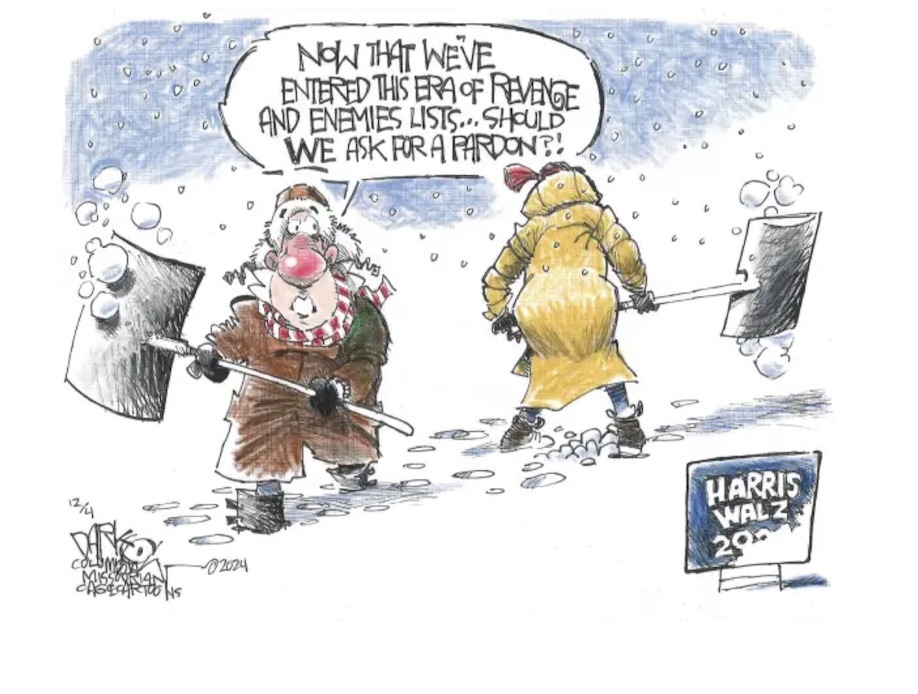
Since the strategy is to wear us down and out, keep our heads spinning, and make us feel powerless in the face of these avalanches of rumors, innuendoes, and news means simply that we cannot lose our focus, let ourselves become weary or tired, or stop paying attention.
My fear is that this seems to be a trial run that starts with the undocumented, then moves on to those with legal status, and finally is used against citizens who express points of views critical of and unsanctioned by the government.
Read about it -
You Will Cry Out Because of Your King

(This article also appeared on LA Progressive, and Counter Currents)
“When we eventually become aware of what we have given up, what it really means to surrender participation, voice, and responsibility, it will be too late.”
“Now is the time to stir from our shock and catatonic state and begin to act, demonstrate, drown out town hall and community gatherings wherever they occur before we completely lose all memory of participatory debate, discourse, dialogue, or what the compromise and tensions of democracy look and feel like.”
“In the scriptures that I use, First Samuel, chapter 8 offers a hauntingly accurate explanation for this historical moment. The words in this text describe people who felt let down by government, troubled by the state of the economy, fearful of an uncertain future, scared of changes, living where one set of political leaders was perceived as ill-equipped to serve the interest of some people, and where apparently a few had grown richer at the expense of the poor becoming poorer. Whether this was true or only perceived to be true we do not know.”
“The 2024 elections appears to have similarities with the text, where the framing of the issues were the ruinous effects of inflation; immigrants taking jobs and criminally violating communities; and where Diversity, Equity, and Inclusion (DEI) policies forced the hiring of incompetence and overlooked those who were more deserving and were white, male, and straight. A significant portion of the population wanted a leader who would address their fears and resolve their anxieties of an inclusive world. The political ideologies of the campaigns either cited an increasingly diverse population or the dangerous nature of democracy as it strived to include diversity and create equal opportunities. The ideologies were on a collision course. One ideology warned of the threat to democracy, and the other offered the protection of the American way of life through a strongman that would protect the country by reclaiming and protecting its past. When talking about the things that were seen or felt as wrong with the nation, the strongman pledged, “I alone can fix it.” Some people clamored for this strongman—this king, the restoration of the past, and the good ole days.”
Read about it -
Running in Circles on Racial Justice
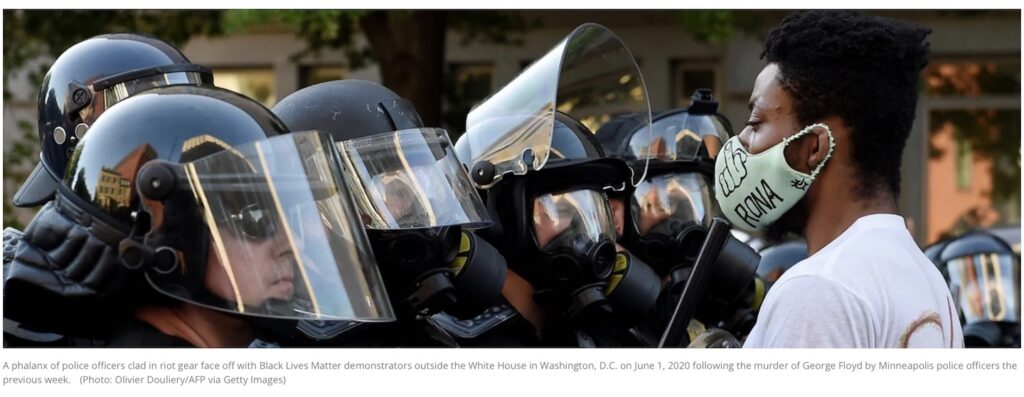 (This article also appeared on numerous popular and well-read sites: CounterCurrents, RadicalDiscipleship, LaProgressive.)
(This article also appeared on numerous popular and well-read sites: CounterCurrents, RadicalDiscipleship, LaProgressive.)Race history and the many initiatives to rectify past wrongs is more of a circle than a linear line. It may be an expanding circle considering advances, but for every victory won there is a vicious throw back. It is almost like the 1993 movie Groundhog Day where morning after morning we awaken to history repeating itself, and where victories of racial justice are swept away by the courts or a change in the body politic. The struggle continues, and in many cases, we must begin again.
Every racial justice victory in the United States came about because of the Civil War and the various modes of resistance employed by victims of racial injustices. Mass protests and resistance has generally forced those in power to seek easy answers to placate the anger of the victims of racial injustice. But every attempt to satisfy and pacify the various protests is met with vociferous protests that erase hard fought victories. Just a few examples over four centuries in U.S. history serve as evidence. At each juncture of political protest those in power have historically responded with various initiatives designed to calm the uprisings and unrest. However, any advance is quickly eradicated under the guise of reverse discrimination.
Read about it -
As US Ambassador Rev. Mike Huckabee will push for ‘End Times’ in Palestine
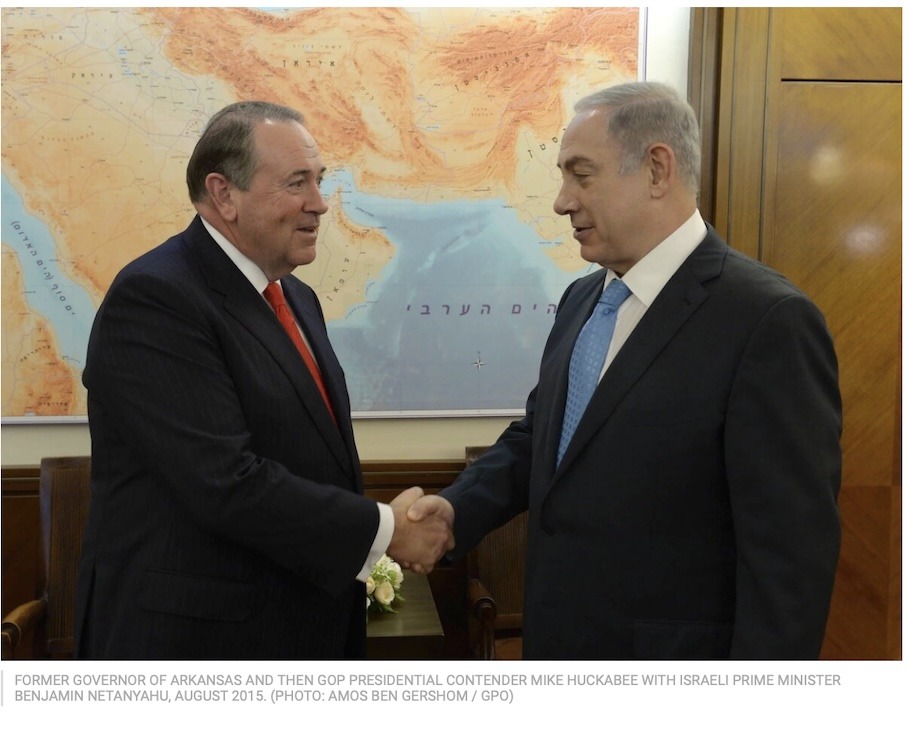 As U.S. ambassador to Israel, Mike Huckabee will likely go further in advocating for the destruction of Palestine, stepping up the holocaust in Gaza and pushing for the annexation of Gaza and the West Bank.
As U.S. ambassador to Israel, Mike Huckabee will likely go further in advocating for the destruction of Palestine, stepping up the holocaust in Gaza and pushing for the annexation of Gaza and the West Bank.Huckabee is a former presidential candidate and governor of Arkansas. But those things are not the problem. The problem is that Huckabee is a Christian Zionist and believes in “End of Times” prophecy, namely that Jews must be established in a sovereign state of Israel to usher in the Second Coming of Jesus Christ. In this theology, Jesus will come again and reign over Israel and the world, and he will create a new age where all will be called to worship Christ. Christ will sit in judgment separating the righteous from the unrighteous – believers from nonbelievers. Those who believe will be welcomed into his kingdom and graces, and those who don’t will be condemned into Hell and torment.
Read about it -
I Don’t Want to Hear About Your Holocaust Any Longer
Read about it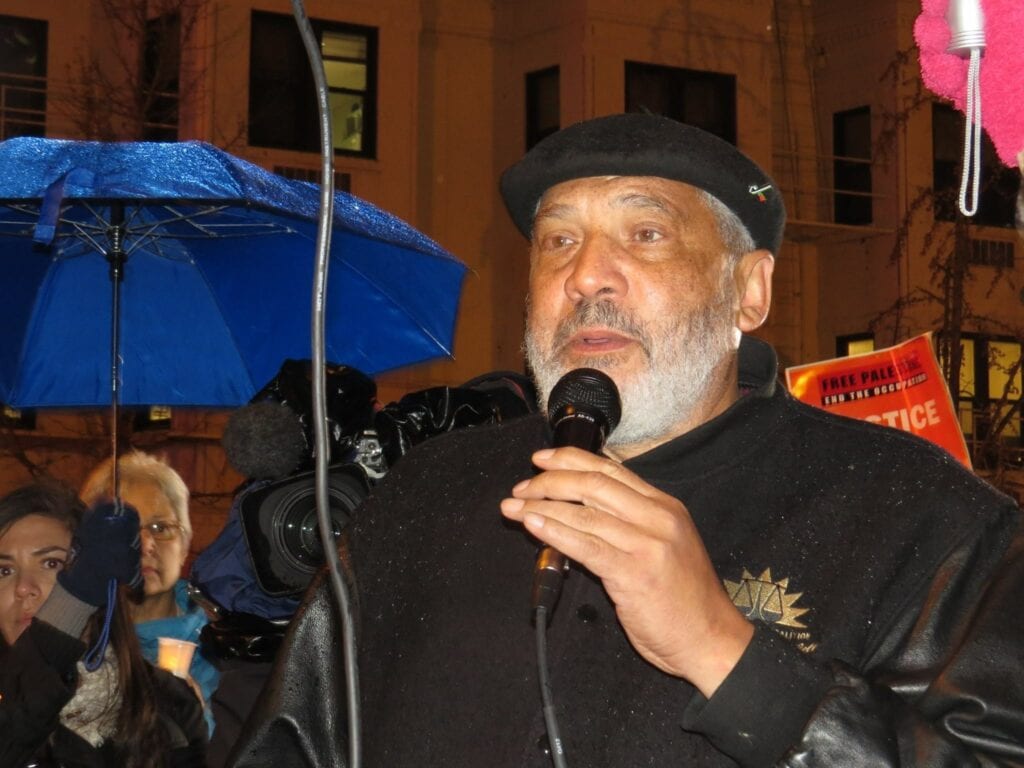 I do not want to hear about the Jewish Holocaust any longer, particularly as Israel carries out a Holocaust in Gaza and the West Bank, and have spread their pogrom into Lebanon, Iran, and Syria. It is not that I do not believe that the European Holocaust should cause pause and demand that the horrors of it be contemplated and the victims honored, but one holocaust does not justify or excuse another. When the cry in the aftermath of the European holocaust is “Never Again!” that should apply to everywhere in the world, but evidently those words are reserved for one particular group of people and at one particular moment in history. I do not buy that, however. To only define a holocaust to a particular group in Europe is to ignore the many holocausts that have existed in history – past and present. I think of the Middle Passage, chattel slavery in the US, the treatment of Indigenous people in the Americas, Darfur, The Killing Fields of the Khmer Rouge, or the Tutsis in Rwanda to name a few. Wherever and whenever people are faced with a blatant disregard for their existence because of governmental policy or mob incitement that is an ingredient to a holocaust. “Never Again!” should apply to all history and even in this current moment. Each holocaust should be just as startling that demands condemnation as the European one has.
I do not want to hear about the Jewish Holocaust any longer, particularly as Israel carries out a Holocaust in Gaza and the West Bank, and have spread their pogrom into Lebanon, Iran, and Syria. It is not that I do not believe that the European Holocaust should cause pause and demand that the horrors of it be contemplated and the victims honored, but one holocaust does not justify or excuse another. When the cry in the aftermath of the European holocaust is “Never Again!” that should apply to everywhere in the world, but evidently those words are reserved for one particular group of people and at one particular moment in history. I do not buy that, however. To only define a holocaust to a particular group in Europe is to ignore the many holocausts that have existed in history – past and present. I think of the Middle Passage, chattel slavery in the US, the treatment of Indigenous people in the Americas, Darfur, The Killing Fields of the Khmer Rouge, or the Tutsis in Rwanda to name a few. Wherever and whenever people are faced with a blatant disregard for their existence because of governmental policy or mob incitement that is an ingredient to a holocaust. “Never Again!” should apply to all history and even in this current moment. Each holocaust should be just as startling that demands condemnation as the European one has. -
Trump An Orgy in White Maleness

Trump’s campaign was a celebration of maleness. We heard about women being protected whether they wanted it or not. He talked about the size of Arnold Palmer’s penis. Even after the attempt on Trump’s life in Butler, Pennsylvania, he pops back up with his tiny fist in the air, chanting “fight, fight, fight.”
This was the Cowboy, the John Wayne, tougher than Ronald Reagan that white maleness and women were waiting for. Despite all the trials, convictions, adjudication for sexual assault, and the infamous tape where he is heard saying that you can “grab them by the pussy,” his posturing with some of the world’s “strong men” helped to define him as a man’s man. His white male supporters, and more than a majority of white women, dismissed all the Trump rhetoric, its rancor, racism, and the sexism as a celebration of testosterone that reestablished the “strong” white man.
Read about it -
The Culture Wars are Wars of White Supremacy
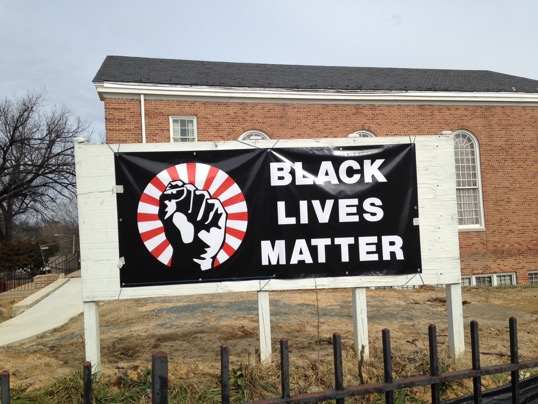 The coded language against “wokeness” is doing what it has always done: trying to protect the fragile body of hate.
The coded language against “wokeness” is doing what it has always done: trying to protect the fragile body of hate.Tuberville and DeSantis are two mouthpieces representing a chorus of other crusaders in the war against “wokeness,” which is code for Blackness and the kind of change that expands inclusion and diversity in the United States. It represents change from the way things used to be and demands that the line be held from the change wrought through expanding diversity and the awakening of peoples who have been marginalized. He, and others like him, want to be seen as standing against encroachments on the mythical white way of life.
Read about it -
Non-Violence is Only Effective When We are Seen
Read about it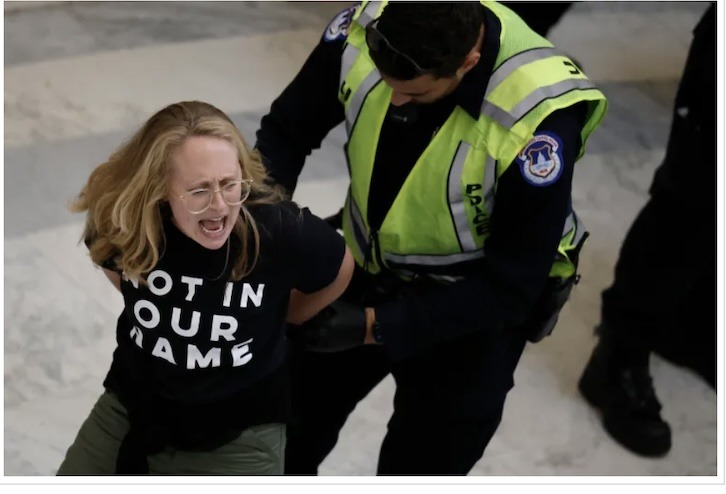 I find myself asking this same question, but in this case regarding political nonviolent action as a change agent. I want to distinguish nonviolence as a political tool and agent, versus a lifestyle and spirituality. Historically nonviolence has been used by oppressed people to break loose from the chains of oppression in the face of an overwhelming specter of violence, weaponry, and usually the power of the state. As a political tactic nonviolence is utilized to expose and embarrass the brutality, inhumanity, and depravity of oppressive power. It has been historically used in an environment where the oppressor possesses carte blanche powers coupled with tools of violence to enforce rules and the interpretations and implementation of laws. On the other side of this equation are those oppressed by those systems of laws and are met when aggrieved with a cavalier and dismissive attitude. When political nonviolence is employed, even in a context where there are little to no guardrails to the brutality, there is a tacit appeal to the larger community to see, empathize, and express moral outrage against what they see. But this requires that people have some empathetic affinity with people who are brutalized and are morally and ethically outraged by what they see. The tree falls in the forest and there are ears to hear and able to interpret and transmit what is heard.
I find myself asking this same question, but in this case regarding political nonviolent action as a change agent. I want to distinguish nonviolence as a political tool and agent, versus a lifestyle and spirituality. Historically nonviolence has been used by oppressed people to break loose from the chains of oppression in the face of an overwhelming specter of violence, weaponry, and usually the power of the state. As a political tactic nonviolence is utilized to expose and embarrass the brutality, inhumanity, and depravity of oppressive power. It has been historically used in an environment where the oppressor possesses carte blanche powers coupled with tools of violence to enforce rules and the interpretations and implementation of laws. On the other side of this equation are those oppressed by those systems of laws and are met when aggrieved with a cavalier and dismissive attitude. When political nonviolence is employed, even in a context where there are little to no guardrails to the brutality, there is a tacit appeal to the larger community to see, empathize, and express moral outrage against what they see. But this requires that people have some empathetic affinity with people who are brutalized and are morally and ethically outraged by what they see. The tree falls in the forest and there are ears to hear and able to interpret and transmit what is heard. -
It’s Too Late to Still Be Uncommitted

“As the elections come upon us, much attention has turned towards them. People are discussing and debating whether to vote, to remain “uncommitted,” to vote for a third party candidate, or to vote for the Democratic candidate in a statement of history and hope for change.
I have heard people declare that they are tired of voting for a Republican or a Democrat in this two-party system. They state that they are tired of voting for “the lesser of two evils.” I have heard much of the discussion, and such sentiments have come from my friends, comrades, and fellow warriors in the struggle. To each of these statements I share some perspective.
I have not really witnessed a third party building and organizing itself effectively and aggressively except when it is time for an election. I don’t see how a third party becomes a viable alternative without the persistence, passion, militancy, and drive to organize it outside election season. I am not against a third party, but I have not seen a serious attempt to build one in this country.”
Read about it -
Beyond Religious Nationalism

There are numerous organizations holding conferences and meeting, circulating petitions, making statements, and collecting prominent names to condemn Christian Nationalism. Coalitions and religious entities have been coalescing to resist what is being portrayed as an almost new and alarming phenomenon that is gripping the US’s cultural, political, and theological landscape with sharpened and ravenous claws. Though I fundamentally agree with those concerns I have some reservations about the timing and sense of urgency.
One of my questions is how closely are the concerns of these groups designed to coincide with the upcoming presidential elections? Is the timing of the objections, and the sense of urgency surrounding Christian Nationalism more allied with the Democratic Party instead of with the theological and ideological ethics and implications of Christian Nationalist in and of itself.
Read about it -
Outside Agitators: How the Power Elite Talk About Dissent
“The phrases and statements used to justify
 police action against Columbia University students supporting Palestine is a blast from the past. The blast is not a hopeful one, or one that demonstrates how far we have come as a country. Instead, it demonstrates the more things change the more they remain the same. I heard Eric Adams, Mayor of New York City, justifying police action at Columbia by citing the urgency to act because of “Outside Agitators”. These “Outside Agitators”, the rationale goes, infiltrated the student movement at Columbia and spurred them to more extreme actions. These actions would not have happened, the reasoning continues, had it not been for those “Outsiders”. You can hear a stereotypical Southern Sheriff with a beer belly mumbling, ‘our “Ns”, and in this case Columbia students are happy-go-lucky, and don’t make no trouble outside of the usual rowdiness. But Adams is no Southern Sheriff of the 1950s and 60s, but instead a Black man running a major northern police department. It appears that he took a step back in time, and appropriated a classical fascist and segregationist response to dissent. The statement implies that people don’t have a mind to think on their own, or know what they are feeling, or see what they see unless some “Outside Agitator” tells them what to think, feel, and how to interpret their perception. This response beliefs that people are children to be controlled, and most certainly do not have agency of their own.”
police action against Columbia University students supporting Palestine is a blast from the past. The blast is not a hopeful one, or one that demonstrates how far we have come as a country. Instead, it demonstrates the more things change the more they remain the same. I heard Eric Adams, Mayor of New York City, justifying police action at Columbia by citing the urgency to act because of “Outside Agitators”. These “Outside Agitators”, the rationale goes, infiltrated the student movement at Columbia and spurred them to more extreme actions. These actions would not have happened, the reasoning continues, had it not been for those “Outsiders”. You can hear a stereotypical Southern Sheriff with a beer belly mumbling, ‘our “Ns”, and in this case Columbia students are happy-go-lucky, and don’t make no trouble outside of the usual rowdiness. But Adams is no Southern Sheriff of the 1950s and 60s, but instead a Black man running a major northern police department. It appears that he took a step back in time, and appropriated a classical fascist and segregationist response to dissent. The statement implies that people don’t have a mind to think on their own, or know what they are feeling, or see what they see unless some “Outside Agitator” tells them what to think, feel, and how to interpret their perception. This response beliefs that people are children to be controlled, and most certainly do not have agency of their own.”
Read about it -
A Response to Rev. William Barber on Palestinian Resistance
 I understand Rev. Barber’s need to thread the needle, but in a time like this, we need truth-telling and not outrage when it is politically expedient to do so. As Bishop Barber decries and mourns the killings and atrocities carried out by Hamas, he makes the same error that he has made in the past, by diminishing — and at times ignoring the horrendous history of settler colonialism endured by Palestinians. I am not suggesting equivocation, where a massacre by Hamas in Israel is justified by the long history of Palestinian dispossession and oppression. But I am advocating for the consistent and equal acknowledgment of the long pain and suffering of the Palestinian people. Rev. Barber has not done that historically or even in the structure of his Op-Ed, where he mentions Palestinian suffering in a secondary position to the recent attacks upon Israel.
I understand Rev. Barber’s need to thread the needle, but in a time like this, we need truth-telling and not outrage when it is politically expedient to do so. As Bishop Barber decries and mourns the killings and atrocities carried out by Hamas, he makes the same error that he has made in the past, by diminishing — and at times ignoring the horrendous history of settler colonialism endured by Palestinians. I am not suggesting equivocation, where a massacre by Hamas in Israel is justified by the long history of Palestinian dispossession and oppression. But I am advocating for the consistent and equal acknowledgment of the long pain and suffering of the Palestinian people. Rev. Barber has not done that historically or even in the structure of his Op-Ed, where he mentions Palestinian suffering in a secondary position to the recent attacks upon Israel.Rev. Barber seems to want to excuse 75 years of oppression and harm perpetuated by the Israeli regime and aided by a general silence from the world. Through the years, Israelis, Palestinians, Muslims, Christians, and Jews have worked to draw attention to the gross violence and injustices of Israeli occupation. Yet, it seemed that the world was not interested in war crimes, or the genocidal pogroms carried out against the Palestinians.
Read about it -
Thousands of Gazans have gone missing. No one is accounting for them.
 By Miriam Berger and Hajar Harb
By Miriam Berger and Hajar HarbMarch 16, 2024 at 2:00 a.m. EDT
JERUSALEM — A teenager who sold cigarettes. A singer on the rise. An engineer at a local bottling plant. They are among thousands who have been reported missing in Gaza.
Many disappeared under the rubble after airstrikes. Others are believed to have been detained at Israeli checkpoints while fleeing south or trying to return to the north. Some simply left one day and never came back.
Their desperate families search hospitals and contact hotlines set up by International Committee of the Red Cross (ICRC). Theyscour photos of bodies in the streets and of blindfolded men detained by Israeli forces. They share pictures of relatives online, pleading for leads.
From October through February, the ICRC received reports of 5,118 Palestinians missing in Gaza. The Washington Post interviewed 15 people who lost contact with friends and family in Gaza since Oct. 7 — in only two cases were they able to find them. The most painful part, many said, was being in the dark about their fate.
“We hoped that we would succeed in getting even the most basic information,” said Ahmed Jalal, whose brother-in-law Mahmoud Abu Hani, a 25-year-old singer of traditional Arab music, disappeared Feb. 3 while trying to return home to Gaza City.
“Being lost is harder than him having been killed in the war or detained,” Jalal said. “When you are lost, no one knows anything.”
Israel’s war in Gaza, launched after the devastating Hamas-led attack on southern Israel, has killed more than 31,000 people, according to the Gaza Health Ministry, which does not distinguish between combatants and civilians but says the majority of the dead are women and children. The Israel Defense Forces (IDF) estimates it has killed between 11,500 and 13,000 militants, as it seeks to eradicate Hamas from the enclave.
The ministry relies mostly on reports from hospitals for its death counts. With the enclave’s medical system in shambles, Palestinian health officials say many more deaths have gone unrecorded. Roads are impassable and communication networks are unreliable. Israel, meanwhile, will not disclose the identities of the hundreds of residents rights groups believe its forces have detained.
Israel’s government warned that Hamas “is continuing to hold to unrealistic demands” as it prepared to review the latest cease-fire proposal Friday. A ship carrying 200 tons of food — the first attempt to deliver aid by way of a maritime corridor — began offloading its cargo into Gaza on Friday.
The IDF did not comment for this story, but has said previously that “suspects of terrorist activities” in Gaza are arrested and “brought to Israeli territory for further investigation.” Those found not to be involved in terrorist activity are sent back to Gaza, the military has said, and those who remain in detention are treated in accordance with Israeli law.
There has been no systematic effort to account for the missing. Last Friday, five months into the war, Gaza’s Health Ministry published a Google form to start collecting names of the dead and missing.
Under the rubble
In the initial weeks of Israel’s air campaign, the missing were mainly believed to be trapped, dead or alive, under rubble.
Mohammed Bassal, a spokesman for the civil defense emergency services in Gaza, estimates that 8,000 bodies remain in the wreckage. During the first months of the war, rescue teams raced to strike sites when they could. But without proper equipment, he said, they were often left to dig people out by hand — or not at all.
Bassal says his teams in Gaza City rarely find full bodies now, instead uncovering partial remains — most decomposed and unidentifiable.
Ghada al-Kurd, 38, believes her brother, Safwat, his wife, Maysoon, and their10-year-old daughter, Habiba, are among those lost in the ruins.
Kurd’s sister called Nov. 19 to say that a missile had struck the three-story house where their brother was staying in the Jabalya refugee camp in northern Gaza. At first, neighbors said no one was home. Then they saw legs protruding from the rubble.
But without heavy equipment, Kurd said by phone from Rafah, rescuers “were unable to recover them, and they are still missing.” The family is not in the health ministry’s official list of the dead.
Ghada Isaa, who lives in the town of Salfit in the occupied West Bank, last heard from her sister, Wifa’a Alamoor, in Gaza City on Nov. 8. The 50-year-old had no immediate family left in the enclave, Issa said.
Israel’s military bombed Alamoor’s neighborhood near al-Shifa Hospital, saying it was targeting Hamas fighters in the area. Her landlord, who lives abroad, told Isaa the apartment next door was hit. Was her sister there?
“I don’t know,” said Isaa. “There was no one with her. No one to go look for her.”
“God willing, we will find her,” she said. “In the end we all die, but we must know her fate.”
Suspected Israeli detentions
When Israel invaded Gaza in late October, it directed residents in the northern part of the territory to flee south. Raed Halabi, a 30-year-old programmer, heeded the order. His brother, Mahmoud, was traveling with him and says he was detained by Israeli forces.
On Nov. 15, according to Mahmoud, the brothers approached the main Israeli checkpoint, called Netzarim, on the Salah al-Din highway.
“The Israeli soldier called him over on the microphone,” Mahmoud said. Raed’s wife and three children were also there. “They said, ‘Give your son to his mom and come.’”
Raed complied, Mahmoud said. It was the last his family saw of him.
“We are civilians,” his brother said. “He didn’t have any connection with [militant groups].”
Mahmoud contacted the ICRC. But Israel has denied the organization access to its detention centers since Oct. 7. Hamas has also refused the ICRC’s requests to visit Israelis kidnapped by the group on Oct. 7. More than 100 remain in captivity in Gaza.
“We understand the immense pain of family members who are anxiously waiting for news of their loved one, and the frustration when this doesn’t happen in a timely manner,” said ICRC spokeswoman Sarah Davies.
Ziad Musa, 26, has “no trust” that any humanitarian organization will help his friend, Adel Abu Aisha.
“They have left civilians behind,” he said.
Abu Aisha, an engineer at a Coca Cola bottling facility, disappeared during an Israeli raid two months ago in Gaza City, Musa said. He suspects he was detained.
The IDF did not respond to questions about Aisha and Halabi.
The Israeli rights group HaMoked has received reports of 425 Gazans, nearly all men, believed to have been detained since late October, according to executive director Jessica Montell. Israeli authorities, including the Supreme Court, have repeatedly rejected HaMoked’s petitions for the information to be made public, Montell said.
“We have been trying to get an answer to the very simple question of who is the address for a response to the status of Gaza detainees,” she said. “We are not able to provide any relief to these families.”
Lost and ‘left behind’
Mahmood Abu Hani, the singer, made it safely from Gaza City to Nuseirat in the center of the enclave early in the war. Last month he tried to return home, and vanished.
“He said people were going home as there were no soldiers on the way,” said his sister, Haleema Abu Hani. He “left Gaza City without any clothes or anything. It was winter and he was sleeping in a tent.”
Heleft around 8 a.m.Somewhere past Wadi Gaza, which divides the enclave’s northern and southern regions, his phone died or was turned off. His family has heard nothing from him since.
There have been reunions, too, amid the chaos of war.
For a nerve-racking month, Shadyal-Hasoumy said, the family feared the worst for his10-year-old nephew Yousef. The third-grader was separated from his family Nov. 18 at the chaotic Netzarim checkpoint.
The family continued south. The scared boy headed back north.
But “the people around him tried to help,” al-Hasoumy said. A family took Yousef in. After a month of calls between communication outages, the Hasoumys found him.
Two more months passed before the boy could make it safely to Rafah and reunite with his family, Shady said.
In that span, more people went missing.
“With every [Israeli military] ground entry into areas, we receive hundreds of appeals for missing family members,” Bassalsaid.
Ziad Sabah, 23, disappeared early Feb. 13 in Deir el-Balah, in central Gaza. He was “bored and wanted to take a walk,” said his father, Mohammed.
Ziad has schizophrenia, his father said, and his symptoms worsened after he was pulled from the rubble of a strike in November. Now the family wonders: Did heget lost? Was he aggressive at a checkpoint? Is he even still alive?
Similar questions torment the al-Masry family.
Haitham, 17, left the U.N. school in Rafah where the family was sheltering on Feb. 11 to sell cigarettes at a market, his father Mohammed said. He never returned.
A Post reporter was the first person to call about his son, al-Masry said last week.
“Do you have any news?
-
“If Everything is Antisemitic then Nothing Is”
Read about it Many of us are increasingly confused about what and where antisemitism is and is not. This latest incident is a good example of this confusion. Groups like the ADL have promoted the conflation of Israel with Judaism, creating a religious and political sledge-hammer that can be wielded when it is convenient and advantageous to do so. The ADL and numerous other Zionist organizations have gone to great lengths to make the criticism of Israel synonymous with hatred of Judaism and Jews. In that context, any act against Zionist ideology, or any critique of any politically connected Zionist is construed as an act of antisemitism.
Many of us are increasingly confused about what and where antisemitism is and is not. This latest incident is a good example of this confusion. Groups like the ADL have promoted the conflation of Israel with Judaism, creating a religious and political sledge-hammer that can be wielded when it is convenient and advantageous to do so. The ADL and numerous other Zionist organizations have gone to great lengths to make the criticism of Israel synonymous with hatred of Judaism and Jews. In that context, any act against Zionist ideology, or any critique of any politically connected Zionist is construed as an act of antisemitism. -
“The Anti-Woke Warriors”
 Ron DeSantis, governor and presidential candidate, says defiantly, “Florida is where woke comes to die.” He even picked a fight with Mickey Mouse to demonstrate his resolve. As Farmer’s Insurance Company and other insurance companies announce their exit from Florida, the Republican Party’s explanation is not failed governmental policies, but “wokeness.” Meanwhile, Alabama Sen. Tommy Tuberville is holding up military promotions and appointments because of his war with “wokeness.”
Ron DeSantis, governor and presidential candidate, says defiantly, “Florida is where woke comes to die.” He even picked a fight with Mickey Mouse to demonstrate his resolve. As Farmer’s Insurance Company and other insurance companies announce their exit from Florida, the Republican Party’s explanation is not failed governmental policies, but “wokeness.” Meanwhile, Alabama Sen. Tommy Tuberville is holding up military promotions and appointments because of his war with “wokeness.”Tuberville and DeSantis are two mouthpieces representing a chorus of other crusaders in the war against “wokeness,” which is code for Blackness and the kind of change that expands inclusion and diversity in the United States. It represents change from the way things used to be and demands that the line be held from the change wrought through expanding diversity and the awakening of peoples who have been marginalized. He, and others like him, want to be seen as standing against encroachments on the mythical white way of life.
Read about it -
“Elliott Abrams Has Left Bloody Footprints Across the Globe”
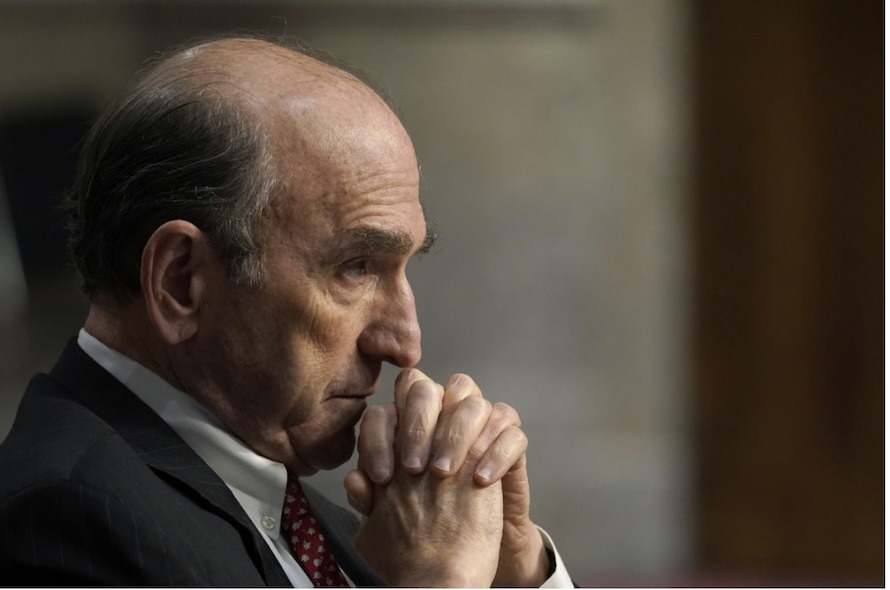 “Under Abrams’ watch, over the 12 years of the Reagan/Bush Sr. administrations, 75,000 Salvadorians were killed. In the village of El Mozote, the army’s Atlácatl Battalion herded women and children into a church convent and opened fire with U.S.-supplied M-16 automatic rifles before burning the building down. One hundred and forty children, average age six, were killed. In 1994, with blood still dripping from his hands, Abrams referred to the U.S.’s record on El Salvador as a “fabulous achievement.”
“Under Abrams’ watch, over the 12 years of the Reagan/Bush Sr. administrations, 75,000 Salvadorians were killed. In the village of El Mozote, the army’s Atlácatl Battalion herded women and children into a church convent and opened fire with U.S.-supplied M-16 automatic rifles before burning the building down. One hundred and forty children, average age six, were killed. In 1994, with blood still dripping from his hands, Abrams referred to the U.S.’s record on El Salvador as a “fabulous achievement.”In addition to supporting the Salvadorian junta, Abrams was a defender of the Guatemalan Montt regime which oversaw the mass murder, rape and torture of scores of Indigenous Ixil Mayan people in the 1980s. The Montt regime was so brutal that it was later classified by the United Nations as genocidal. From his conviction for lying to Congress during the Iran-Contra affair, to his roles supporting the Iraq war, scuttling the Iran nuclear deal, and attempting to orchestrate a coup in Venezuela as recently as 2019, one thing is clear: Abrams doesn’t have a diplomatic bone in his body.”
Read about it -
“Christian Nationalism: An Existential Agreement with God”
 Newt Gingrich broke onto the national political scene with his “Contract with America.” It was the offering of an agreement, that if the public allowed the Gingrich coalition to lead, that coalition would then deliver on a number of points in the contract. Whether you agreed with the framing of this contract or not it conjured the image of the covenant between God and the people in the wilderness established through Moses on Mt. Sinai. There is an “If” and “then” equation to a covenant. One act is related to the other. One thing is related to the next. One thing is required in order to get to the other thing. A covenant is where at least two parties enter into an agreement.
Newt Gingrich broke onto the national political scene with his “Contract with America.” It was the offering of an agreement, that if the public allowed the Gingrich coalition to lead, that coalition would then deliver on a number of points in the contract. Whether you agreed with the framing of this contract or not it conjured the image of the covenant between God and the people in the wilderness established through Moses on Mt. Sinai. There is an “If” and “then” equation to a covenant. One act is related to the other. One thing is related to the next. One thing is required in order to get to the other thing. A covenant is where at least two parties enter into an agreement.So-called Christian Nationalism addresses the concept of a covenant, or a contract. In this view, America is the promise of God, and blessings will unfold, fulfillment will be realized, and the country will be the “City on the Hill” as long as its people uphold their part of the bargain. If the nation fails in upholding its agreement the blessings will be squandered, the country will be in decay, and the hopes found will become lost. Hence, we hear the assertions that America was founded on Christian values and principles, and its laws should reflect that. Christian norms should be upheld lest the country fall into decadence and decay. All of the assumptions, of course, are built on concepts of a conquering god, patriarchy and white supremacy.
Read about it -
“Freeing God to Be God”
 Orthodoxy manufactures a “truth” that is created by the empowered to establish an accepted and authorized framework of belief. The notion of orthodox establishes an autocratic and immutable belief system, and makes people conform or stand out as heretics. The acceptance of a theological norm places people, cultures, and even nations within the theological/ideological circle, or outside of it.
Orthodoxy manufactures a “truth” that is created by the empowered to establish an accepted and authorized framework of belief. The notion of orthodox establishes an autocratic and immutable belief system, and makes people conform or stand out as heretics. The acceptance of a theological norm places people, cultures, and even nations within the theological/ideological circle, or outside of it.I do not want people to think that when I refer to orthodoxy that I am singling out any one religious tradition. Orthodoxy applies to all movements that disallows any other interpretation of God. It demands an unquestionable adherence to its tenets of belief, and its accompanying customs and rituals. This also applies to protestant traditions, because after protesting and rebelling against the orthodox theologies of their originating bodies they created, over time, their own sense of immutable and required systems of belief. Therefore the various evangelical movements have also created systems of centralized theologies, necessary creeds, and expected practices. Some tenets of the US orthodox evangelicalism is expressed in terms of being anti-choice, anti-homosexual, affirming an archaic patriarchal structure of males and females, Christian Zionism, support of Israel, and various other perspectives that includes the support of government.
Read about it -
“A Letter to Supporters of Israel: It Is Time to Break Your Silence”
 Dear Supporters of Israel,
Dear Supporters of Israel,It is time to step out and criticize this country that has operated above accountability. Things are spiraling out of control. They have been out of control for some time, but now the insanity and madness are being exposed to the world, and this arrogant behavior must be brought into question for the sake of justice, humanity, and the survival of Israel.
Recently, Israeli Occupation Forces entered the refugee camp of Jenin (January 2023), killing at least 10 Palestinians. Among the dead was a 61-year-old Black Palestinian mother peeking through blinds. Then, in February, a brazen attack by Israeli forces was carried out in Nablus that killed at least 11 and injured 102 Palestinians.
Read about it -
“Has Fox News ‘Found Religion’ by Firing Tucker Carlson?”
Read about it …if Fox did find religion, why did it take so long? Religion is not something that is found overnight. It is a conversion that moves us when it takes hold at the core of our being. It’s hard to believe that Fox has suddenly seen the light and come to the conclusion that the blatant racism, hatred, and xenophobia that the network has trafficked in for so long is not something they want to continue. Does Fox News want us to believe that it has seen the light and knelt at the altar of repentance because it finally jettisoned the leading and most incendiary voice of racial hatred?
…if Fox did find religion, why did it take so long? Religion is not something that is found overnight. It is a conversion that moves us when it takes hold at the core of our being. It’s hard to believe that Fox has suddenly seen the light and come to the conclusion that the blatant racism, hatred, and xenophobia that the network has trafficked in for so long is not something they want to continue. Does Fox News want us to believe that it has seen the light and knelt at the altar of repentance because it finally jettisoned the leading and most incendiary voice of racial hatred? -
Conversation on WPFW-FM with Dr. Yasser Abu-Jamei, Director of The Gaza Mental Health Program
-
The Morning After the Mid-Term Elections – Analysis and Commentary with Rev. Traci Blackmon, Rev. William Lamar, IV and Mr. Terry Lynch
- Read about it
Speaking with Ariel Gold, Executive Director, Fellowship of Reconciliation. Aired on WPFW FM 89.3 on September 14, 2022
-
It Is Harder to End a War Than Begin One
Twenty years ago planes crashed into the World Trade Centers, the Pentagon, and a field in Pennslyvania. There was disbelief, weeping, and shock as people in the affected areas lookied for their loved ones. There was a deep eeriness in the air, and grief and disbelief set in, and then the tone began to shift to revenge and retribution. Chants began to arise like “USA! USA! USA!” Politicans and preachers began to use the phrase “God bless America,” as if America was somehow more deserving of God’s blessings than anywhere else. Three days later I was speaking on the phone with an insurance company representative about a personal matter, and the insurnace represenatative paused the call so that the entire office could sing “God Bless America.” It was a time, a moment, and a setting that the American public could be conjoled and sold anything seemingly patriotic and it was. The military went into Afghanistan to dislodge Al Queda, and it stayed to create a new government and country. Something that the Soviets had tried to do previously. But that wasn’t enough because the neo-cons and the defensive contractors with the military industrialists decided that it was an opportunity to reconstruct a region in our own image, to control the natural resources of the region, and to create governments loyal to the interest of the west and particularly the US. The US invaded Iraq under false pretenses as a result. If you remember there were claims of weapons of mass destruction, that Saddam Hussein was offering asylum to Al Queda, and any other excuse to invade Iraq, disassemble a nation and attempt to reassemble one in the image and imagination of the US. If the US controlled Afghanistan and Iraq then with the assistance of their client state, Israel, could put maximum pressure on Iran for its surrender. All of this failed. Twenty years later the US has left Afghanistan in failure, watching the cities and towns of the country fall to the Taliban without resistance.
Read about it